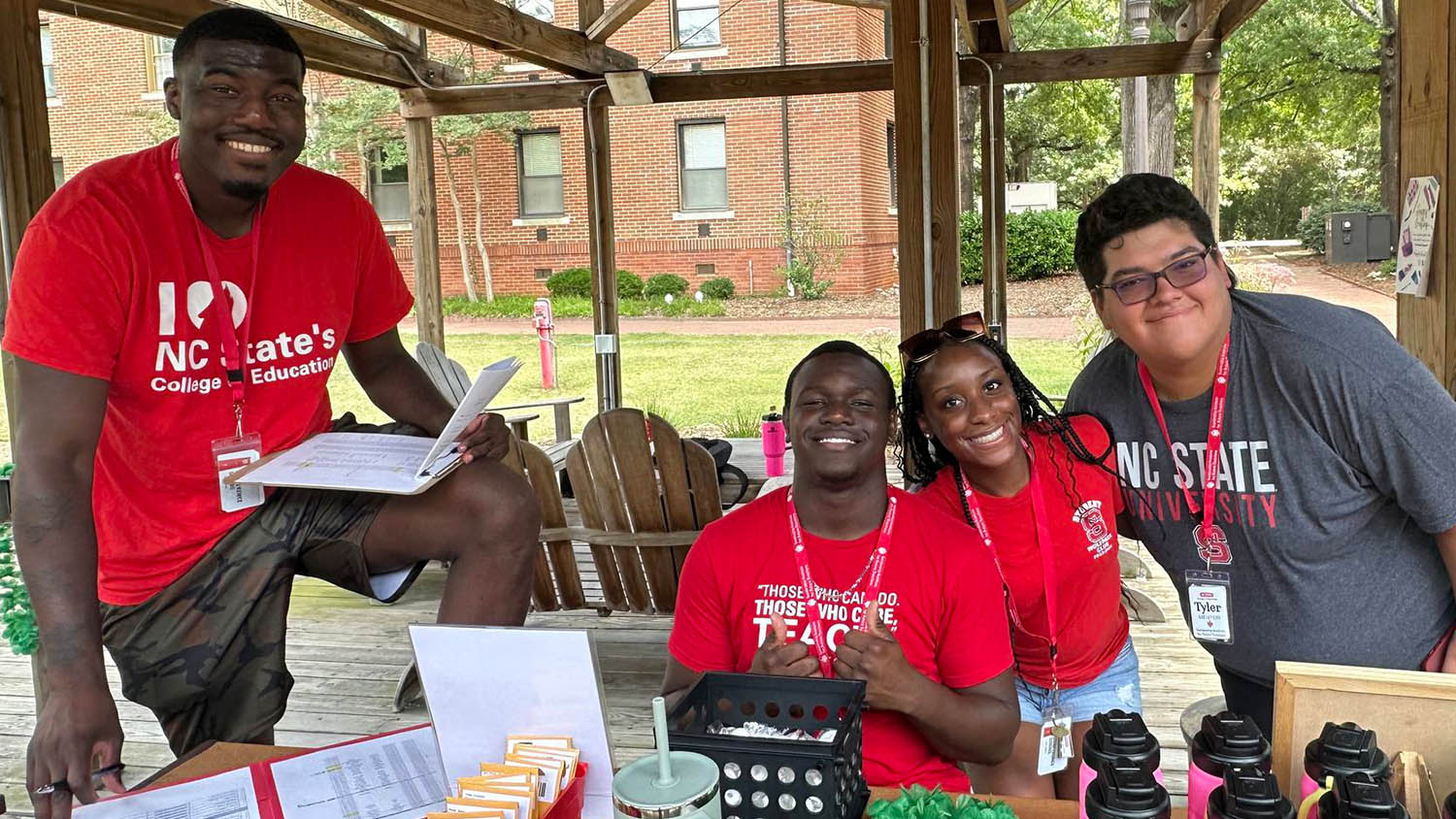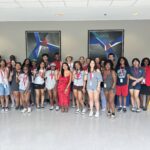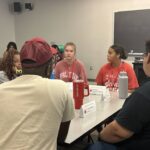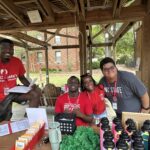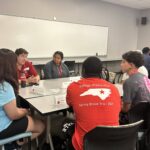Students, faculty and staff in the NC State College of Education spent summer 2024 gearing up for a new academic year, leading and engaging in professional development, encouraging new students to join the teaching profession and traveling to other educational institutions around the world.
View a few highlights of the work our people engaged in over the summer below:
Transformational Scholars Return From Costa Rica As More ‘Culturally Aware, Empathetic and Inspired Future Educators’
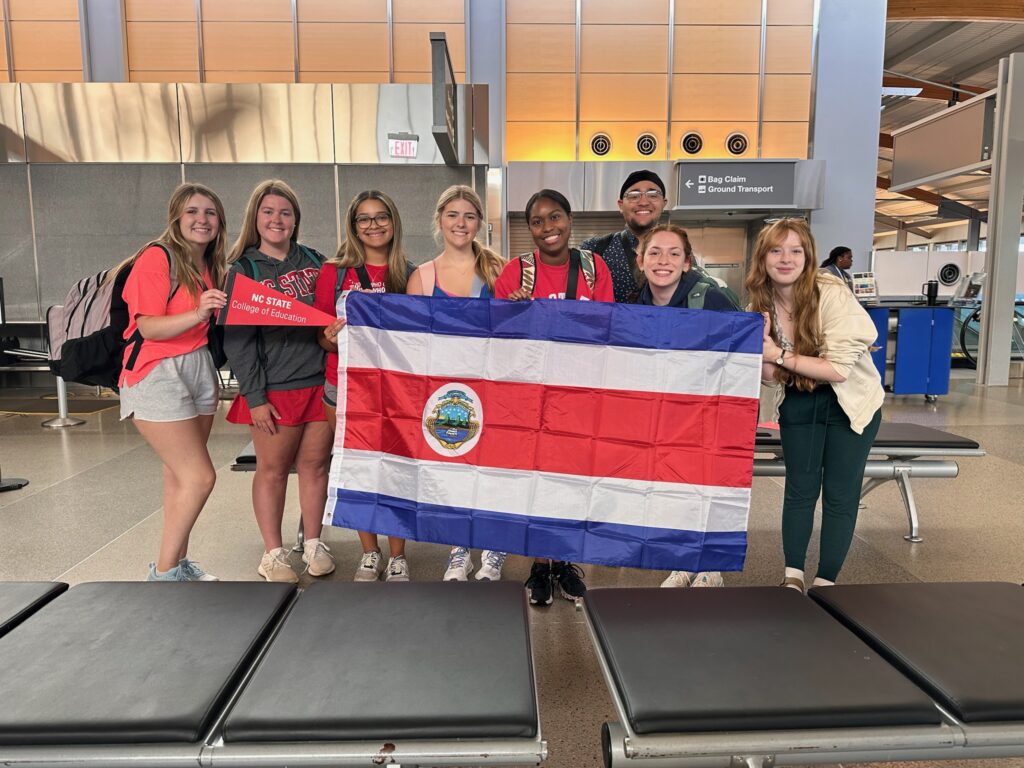
Eight students in the NC State College of Education’s Transformational Scholarships Program spent two weeks in Costa Rica this summer, where they learned more about diverse cultures, developed their Spanish-speaking skills and gained a new perspective on the field of education.
“With our students going back into eastern North Carolina, it’s important for them to have this wide range of experiences,” said Trisha Mackey, the director of the Transformational Scholarships Program, who co-led the trip along with Associate Professor of Educational Psychology DeLeon Gray and Director of Global Programs Ajaya Francis Jonas. “Being able to learn about different cultures will just transform them into well-rounded educators who will be able to create classroom environments for all of their students to learn and grow.”
During the trip, students took intensive Spanish classes through the Intercultura Spanish School, volunteered at a local preschool and spent time working with CREAR, a supplemental education program for Costa Rican students that provides after school learning. They also went on a number of excursions, including a coffee tour at the Doka Estate, a trip to the Arenal volcano and Fortuna waterfall, and a zipline tour through the rainforest.
During shared meals or long bus rides, the Transformational Scholars were able to dive deeper into all they were learning — how to navigate a Spanish-speaking environment, Costa Rican culture, supporting students with diverse backgrounds — through reflections led by Gray.
“Being able to discuss what these experiences meant in the context of education in eastern North Carolina was such a gift,” said Mary Ledford, a Transformational Scholar and middle grades English language arts and social studies major. “It was made easier and more meaningful with other Transformational Scholars there to help facilitate that thought process.”
Gray said he was impressed with how the Transformational Scholars grew in their ability to engage with and support learners from different backgrounds throughout the trip.
“They’re returning as more culturally aware, empathetic and inspired future educators, ready to make a positive impact in their classrooms and communities,” Gray said.
North Carolina High School Master Mathematics Teacher Fellows Come Together One Final Time
Eighteen teachers who earned master’s degrees in mathematics education or graduate certificates in the teaching and learning of mathematics through the North Carolina High School Master Mathematics Teacher Fellows program gathered together for one final professional development season on June 24 at the Friday Institute for Educational Innovation.
Participants of the program, which began in 2019 through a grant from the National Science Foundation and recently concluded, had the opportunity during the session to receive and be trained on the new Num Works calculator and hear from keynote speaker Dan Teague, of the North Carolina School of Science and Mathematics.
For most participants, though, the event was an opportunity to both reflect on the support system they built through the program along the way and seize the opportunity to now become leaders in their own right.
“[I’m excited about] just seeing everybody, keeping those connections and encouraging other teachers because we definitely need teachers – we need math teachers – who understand best practices, who understand how students learn and are providing those resources. If I can be an encouragement to somebody else, a resource for somebody else, that’s always a plus,” said participant Ramona Bankston.
The North Carolina High School Master Mathematics Teacher Fellows program was led by Associate Dean for Research and Innovation Karen Hollebrands along with co-principal investigators Associate Professor Erin Krupa and Teaching Professor Molly Fenn.
College of Education Students Provide Mentorship at Leadership Institute for Future Teachers
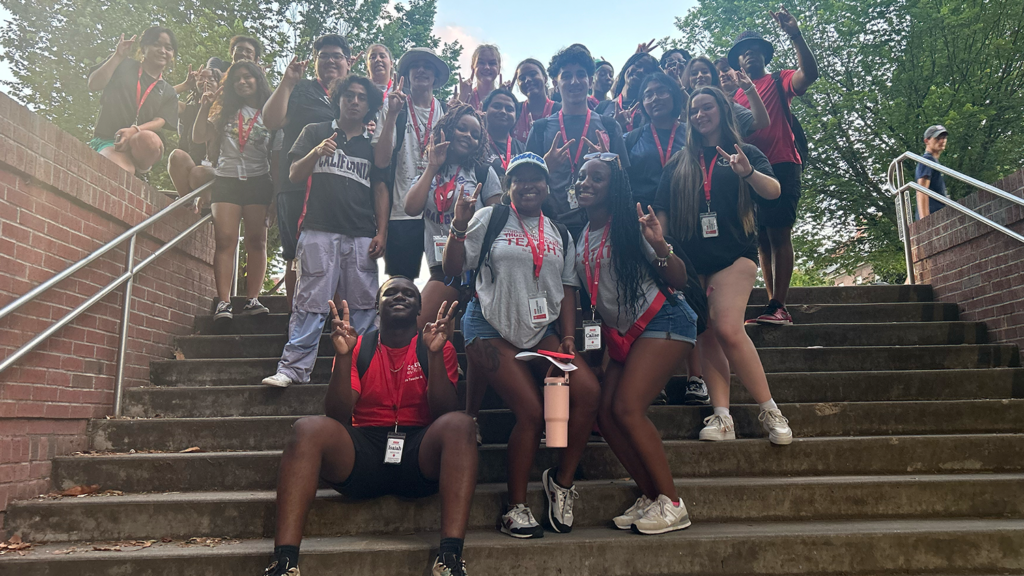
When the high school students who took part in this summer’s Leadership Institute for Future Teachers (LIFT) arrived on NC State’s campus, they were greeted by a group of College of Education students who made them feel at home.
LIFT is a six-day, invitational program hosted by the College of Education for rising high school seniors in North Carolina who are interested in teaching; and since its inception, College of Education students have taken on the role of counselors and mentors.
This summer, each LIFT mentor — Isaiah Johnson, a middle grades English Language Arts and social studies education major; Jania Mackey, a Teaching Fellow and elementary education major, Calise Coleman, a Transformational Scholar and elementary education major; and Tyler Rosado, an English major with concentration in teacher education — set the tone for the day’s activities by leading students through a morning meeting.
Johnson, for example, created a program designed to build confidence through dancing and then, through the rest of the week, helped support his fellow mentor’s morning meetings, which he said embodied a sense of connection, understanding and realness.
“It’s an amazing experience as a mentor to meet others with the same passion and commitment as you,” Johnson said.
The mentors also accompanied the LIFT scholars on trips, including a tour of the North Carolina State Legislative Building; participated in activities, such as a campus tour and photo competition; and worked with them on reflections of what they learned.
“The connections that were made, the joy we had and the insight the kids provided was great,” Johnson said. “I learned history, music, culture and, most of all, I learned more about them. Being able to connect with the kids and build a community and relationship with them was the best part.”
Practicing Teachers Engage in Cultural Immersion Experience in Argentina
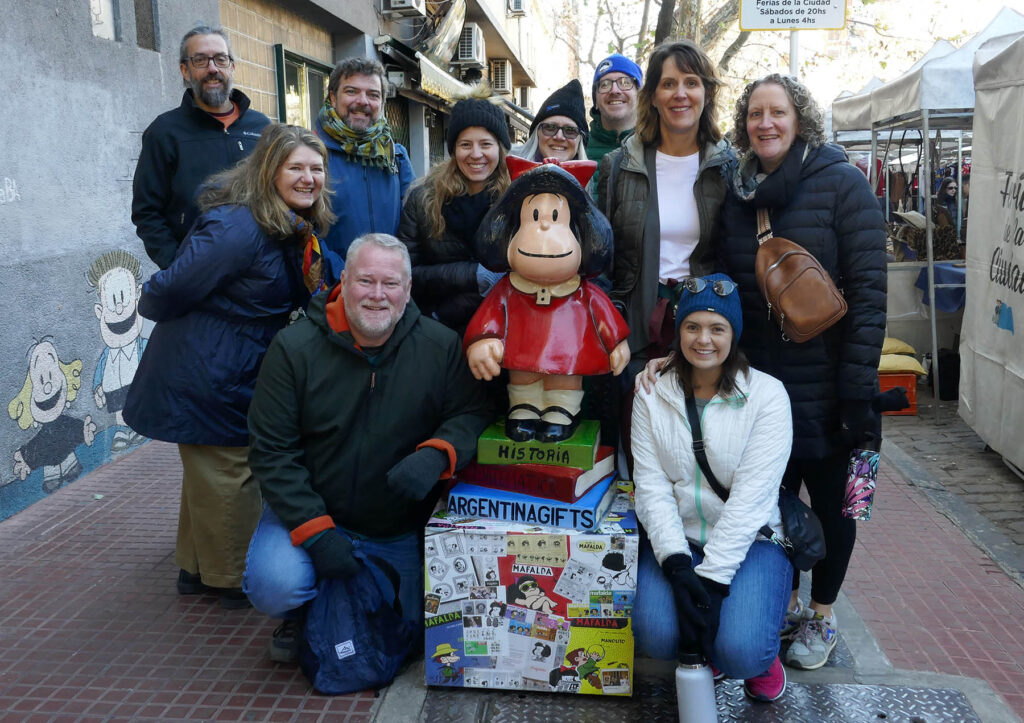
Eight teachers from Wake County Public Schools and the Durham Public Schools systems had the opportunity to travel with Professor of Learning, Design, and Technology Kevin Oliver and Associate Professor of Literacy Education Angela Wiseman to Argentina, where they learned ways to apply varied technical approaches to cultural representation.
Part of the ongoing Cultural Investigation and Digital Representation for Educators (CIDRE) program, the cultural immersion trip provided teachers with the opportunity to research a cultural theme and represent that theme in digital formats including maps, documentaries and augmented and virtual reality.
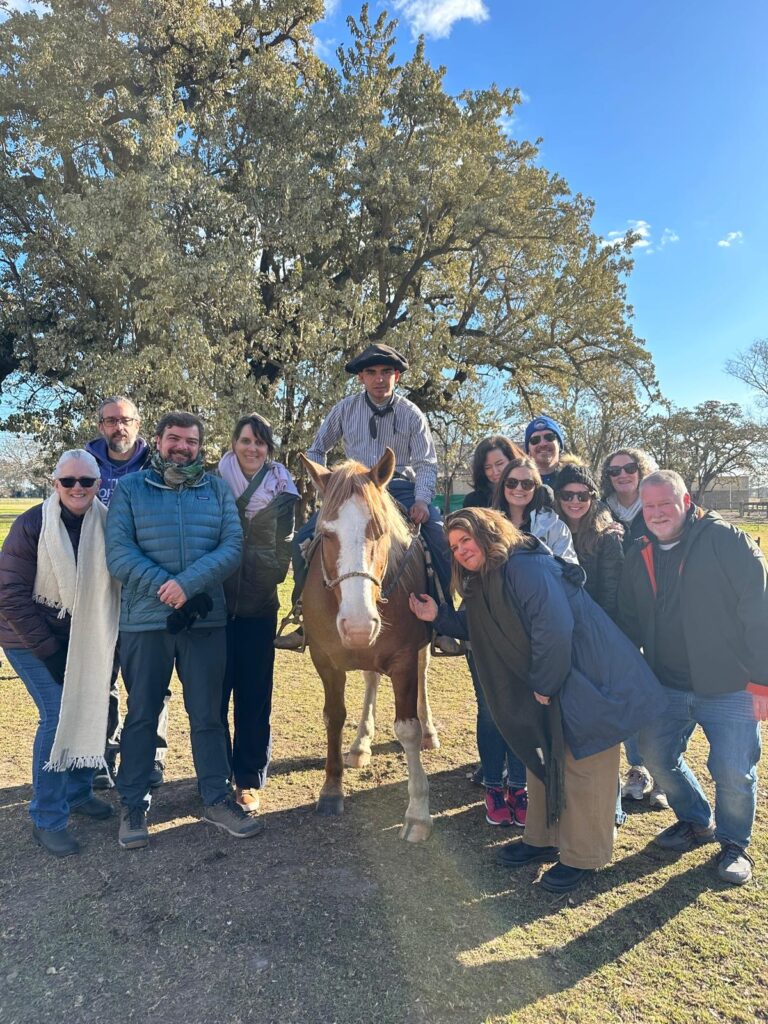
Teachers who participated in the cultural immersion trip spent two weeks in Argentina, where they heard lectures on Argentina’s history and education system from faculty at the Universidad de San Andrés’ Escuela de Educación (UdeSA); visited public and private schools in Buenos Aires; attended cultural events, including the country’s annual Independence Day parade; and toured the San Telmo and La Boca areas of Buenos Aires and visited other regions including Tigre, Luján and San Antonio de Areco.
The experience, Oliver said, not only provides educators with new approaches to cultural representation in the classroom, but helps them learn how education is both similar and different around the world.
“With an enhanced understanding of both why and how one can represent culture digitally, teachers have the knowledge and skills to elevate the voices of increasingly diverse students in their own classrooms,” he said. “By visiting with educators from other countries, we learn about different approaches to teaching similar students or content, as well as similar challenges we face in kind….The UdeSA faculty supporting this year’s program were very informed about Latin American education systems in general and were able to help our group make comparisons between the U.S. and other Latin American systems, such as Chile, which more closely resembles the U.S. in terms of standardized testing.”
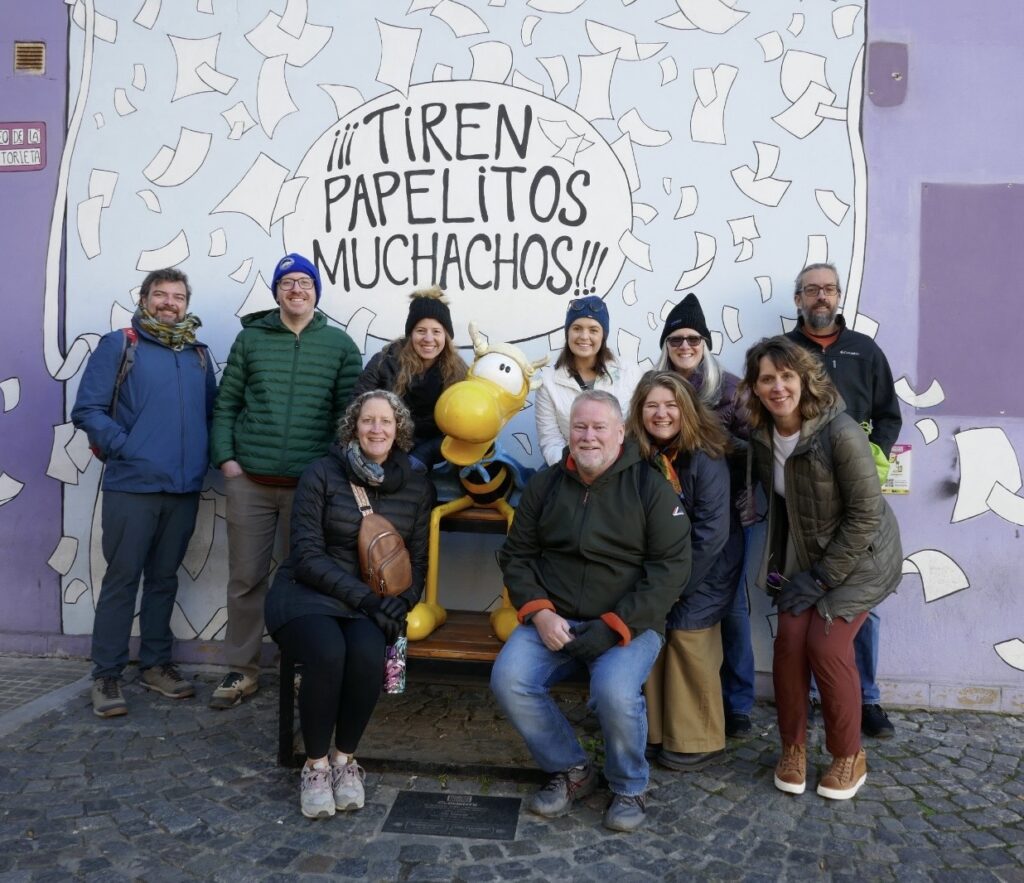
iScholar Students Explore Data, Belonging at D.H. Hill Library
Middle and high school students in the iScholar program, led by Associate Professor of Educational Psychology DeLeon Gray, had the opportunity in July to engage in an immersive data storytelling experience at D.H. Hill Jr. Library on NC State’s campus.
Students were able to see an illustration of a data book by narrating images they have taken of themselves during various educational enrichment activities they engaged in over the past academic year and created a 360-degree data storybook by displaying pages of images on different sections of a 360-degree screen.
iScholar students also had an opportunity during the event to participate in a data scavenger hunt, where they were encouraged to find and interpret different data points and visualizations displayed on the screen. These data points were collected by the students about approximately 200 of their peers’ experiences on belonging.
“This experience has been great,” said Zaida Jackson, an iScholar participant and rising freshman at J.D. Clement Early College High School. “It’s a lot of new stuff that I would have never thought I would have done at this age.”
Belk Center Continues to Support Community Colleges, Plans Ahead for Fall Events
As the Belk Center for Community College Leadership and Research celebrates its fifth anniversary, they spent the summer months continuing to advance their work related to community college transfer, teaching and learning, and leadership development.
The Belk Center convened stakeholder groups of community college presidents, system officials and partners who have identified stronger alignment of transfer pathways from community colleges to four-year institutions with regional workforce demands and the development of technology platforms.
The Belk Center also continued work on its Teaching and Learning Hubs, which have reached more than 1,000 faculty members and 74,000 students since beginning two years ago. Preliminary outcomes from faculty who taught courses through the hubs show that student engagement with the Hub-offered professional learning corresponds with a 2% increase in course pass rates.
“North Carolina’s 2030 statewide attainment goal depends on these practices to improve student retention and success, and the preliminary data from the Teaching & Learning Hubs suggests that this work, and subsequently scaling it, can positively impact student retention and success,” said Belk Center Deputy Director Monica Clark. “The first model of its kind, the Hubs can provide other states and community college systems with a blueprint for supporting equitable student success through the statewide provision of faculty professional learning.”
Belk Center staff also spent the summer planning for several fall 2024 events and initiatives. For example, they conducted work related to the planned September launch of a new leadership development program called the Aspiring Presidents Institute (API). Created in partnership with the North Carolina Association of Community College Presidents, the inaugural API will provide leadership development support to a cohort of 17 senior administrators who plan to pursue presidencies at North Carolina community colleges. In addition, staff worked on planning efforts for the Dallas Herring Lecture, which will celebrate its 10th anniversary this year and will feature Russell Lowery-Hart of the Austin Community College District as a keynote speaker.
Friday Institute Provides Professional Development for Educators
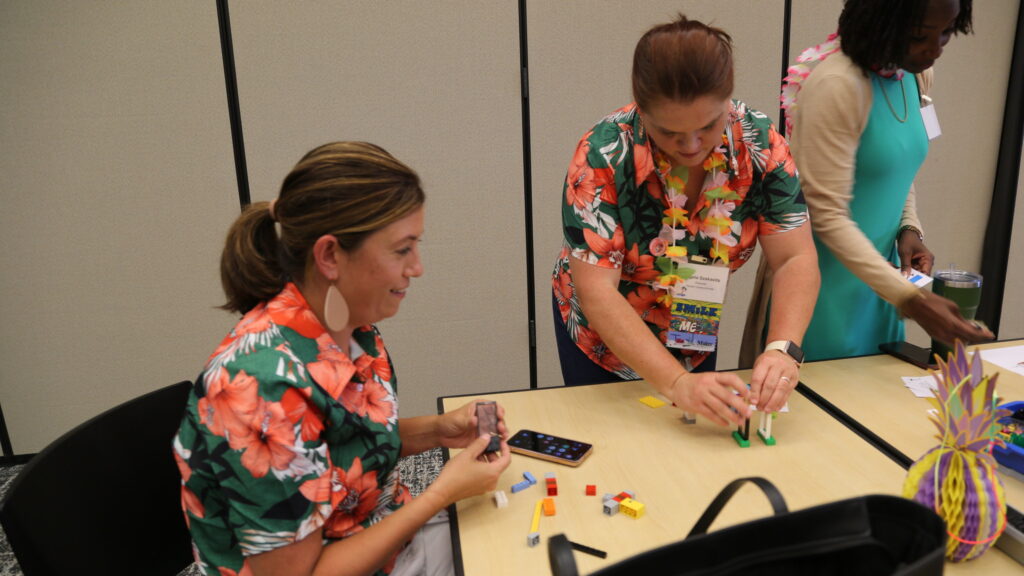
Over the summer, Friday Institute for Educational Innovation provided several professional development opportunities for K-12 teachers as well as educational researchers.
The Moving NC Forward in Teaching Statistics and Data Science 2024 Regional Conference, co-hosted by the Hub for Innovation and Research in Statistics Education (HI-RiSE) in June, convened North Carolina high school and college statistics and data science teachers – including those who prepare high school teachers – and gave them the space to consider ways to move North Carolina forward in building capacity in statistics and data science education. About 50 educators engaged in programming about improving the teaching of statistics and data science in North Carolina.
Also in June, K-12 educators participated in Innovation Island: A Professional Development Adventure, which incorporated engaging workshops, interactive sessions and networking opportunities designed to provide participants with practical strategies, tools and insights to enhance teaching practices, leadership skills and student outcomes. Keynote speaker Robert Taylor, superintendent of Wake County Public Schools, kicked off the event, which was designed to ignite creativity, inspire change and empower educators and leaders to drive innovation in their schools and communities.
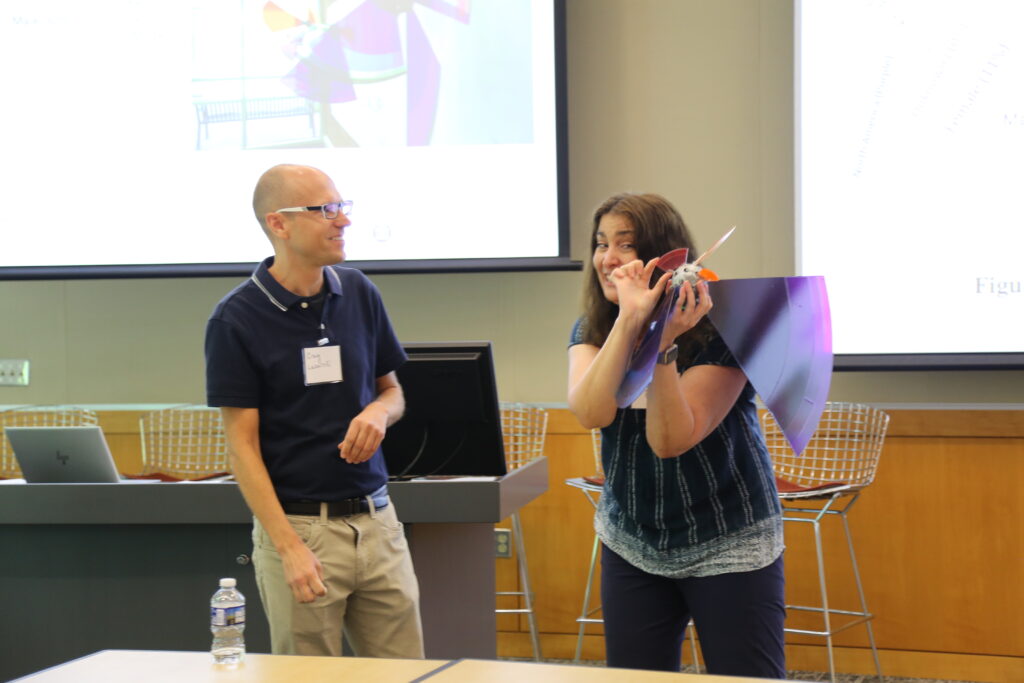
In July, LASER BEAM held a week-long summer workshop consisting of differentiated learning modules, pedagogy and design sessions, and community-building activities to support education researchers in their own professional learning and help them develop an instructional plan for teaching during the upcoming academic year. The event builds off of the work of the National Science Foundation-funded LASER Institute, which aimed to increase the number of education researchers capable of applying data-intensive research methods to understand and improve student learning.
Graduate Students Prepare for Annual Math Summit
Graduate students in the College of Education spent the summer months planning and preparing for the 2024 Math Summit, an annual event held in partnership with Wake, Chapel Hill, Durham, Orange and Johnston county schools that provides professional development for several hundred K-12 math teachers.
Students like Briana Trager ’26, who is earning a Ph.D. in Teacher Education and Learning Sciences’ elementary education in math and sciences concentration, spent the summer engaging in behind-the-scenes work for the event, such as handling venue rental, working with vendors and communicating with presenters and attendees.
Providing support for this event, Trager said, has helped her to learn valuable skills such as the importance of intentional communication as well as leadership and organizational skills that she hopes to apply in future roles supporting educators.
“Seeing a group of educators come together to share their knowledge and energize each other with new ideas is such a great feeling. I hope that wherever I end up after this program that I have the opportunity to continue to support events such as this,” she said.
Supporting Science Teacher Educators Around North Carolina
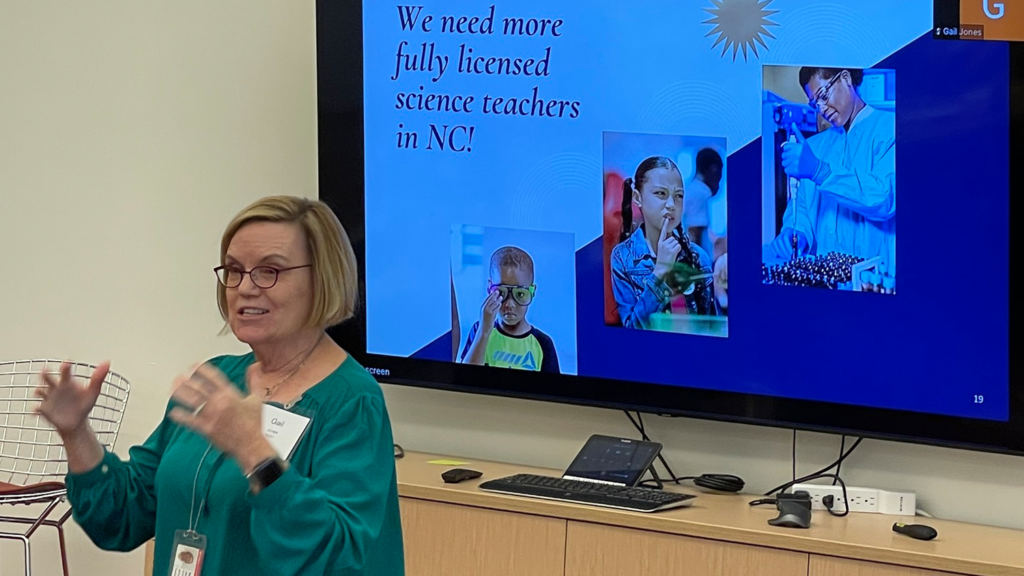
In late May, Professors Sarah Carrier and Gail Jones held their first annual North Carolina Science Teacher Educators event. Science teacher educators from at least eight universities across North Carolina attended the gathering to hear about the new North Carolina science standards, to learn more about alternative licensure pathways for teachers, and to discuss science teacher recruitment and retention, professional development and microcredentials.
Carrier, a professor of science education and the interim head of the Department of Teacher Education and Learning Sciences, organized the event with Jones, an Alumni Distinguished Graduate Professor of Science Education in the Department of STEM Education.
“This meeting provided space for sharing North Carolina science teacher educators’ successes and challenges and established future communications,” Carrier said. “The positive feedback from participants confirmed common goals for future collaborations as we work to support teachers and improve science education in North Carolina.”
METRC: Supporting Students through Curriculum Materials Centers, Creating Inviting Space
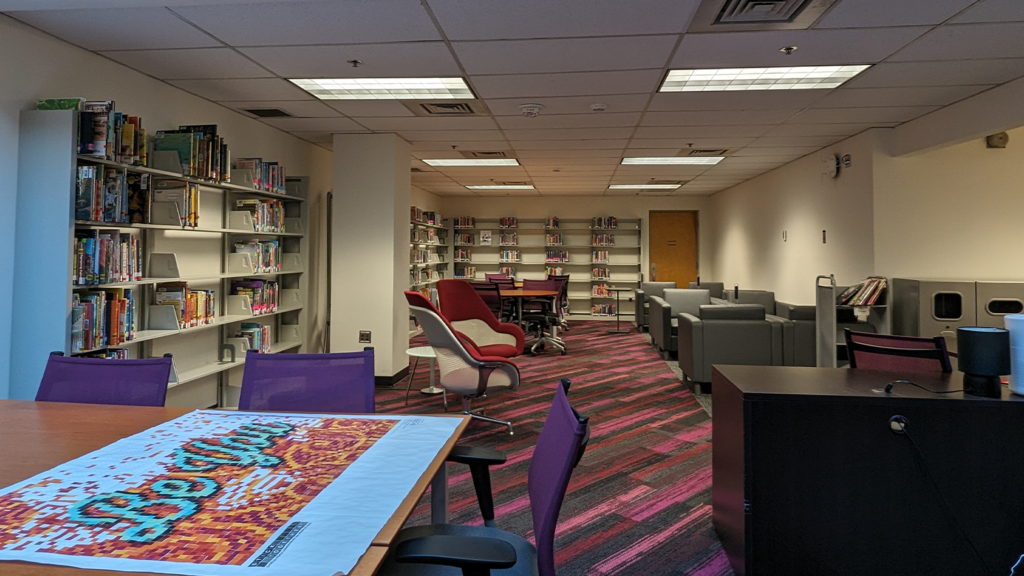
Staff from the NC State College of Education’s Media and Education Technology Resource Center (METRC) preparing for students ahead of the 2024-25 academic year.
METRC staff had the opportunity in June to attend the North Carolina Curriculum Materials Centers (NCCMC) Summer Meeting.
The NCCMC is an organization made up of staff from libraries like METRC that are housed in colleges or university systems and provide targeted support in addition to traditional library roles. Although North Carolina has the highest number of curriculum materials centers (CMCs) in the country, the number of overall facilities nationwide has been declining for several years.
“With new literacy standards and curriculum making their way into K-12 classrooms, we hope to apply what we learned about collection development to get the best Science of Reading resources for our students,” said METRC Assistant Director Scott Summers. “Also, we are evaluating the experience that students at each of our institutions have in the CMC by comparing services, programs and outreach. By studying successful programs at each CMC, we can adapt what we offer at NC State and increase students’ engagement and sense of ownership of our space and offerings.”
Staff who attended the convening, including those from METRC, are also in the early stages of writing a published article in order to highlight curriculum materials centers across the state of North Carolina, in order to spread awareness of the critical role these facilities play at educational institutions.
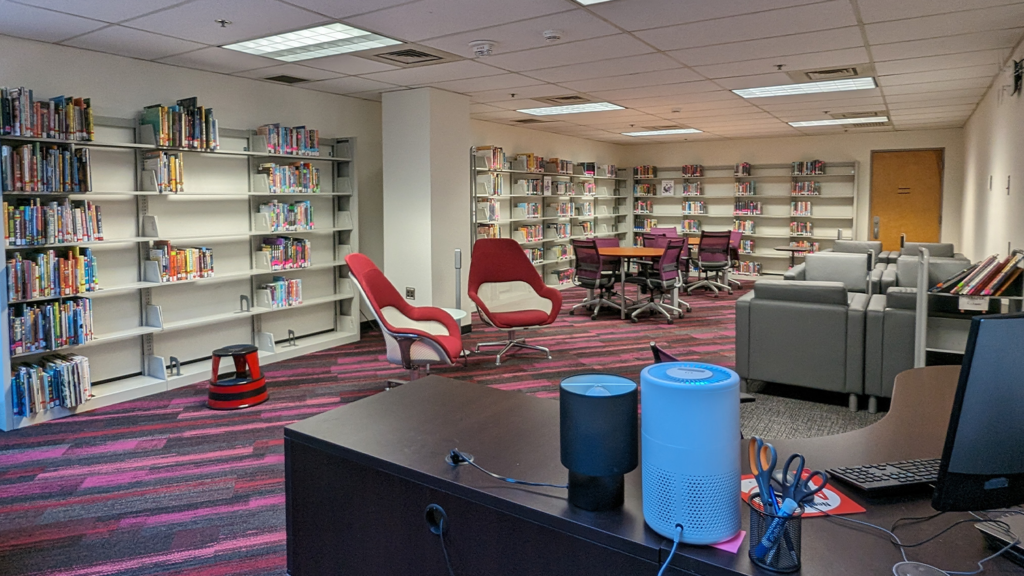
Throughout the summer, METRC staff also added new bookshelves, comfortable seating, hundreds of books, modern light fixtures and clearer signage in their space in the basement of D.H. Hill Jr. Library (B404).
“METRC @ Hill has been updated to create the inviting space METRC is known for,” said Laura Fogle, director of METRC, who added that METRC staff have been cataloging and arranging hundreds of books over the summer so the shelves will be full for students in August.
They have also reorganized their space and storage to make items more visible and accessible, and they are designing new outreach activities to familiarize College of Education students, faculty and staff with its location in Hill Library.
College of Education Operations Team Preparing for 2024-2025
The College of Education Operations team—which includes the Business, HR, and EdIT (Education Information Technology) offices—has been busy ensuring other units and departments across the college get off to a strong start for the 2024-2025 academic year.
EdIT staff, for example, have installed furniture and equipment in new spaces in Lampe Hall 311 and in Ricks Hall 9 and 13 on Main Campus, where the College of Education will have some space for student services and support during the 2024-2025 academic year.
EdIT staff also helped upgrade the Media Education and Technology Resource Center (METRC) space in the basement of D.H. Hill Jr. Library (B404) with new bookshelves, comfortable seating, hundreds of books, modern light fixtures and clearer signage.
On Centennial Campus, EdIT staff are updating the technology in the conference rooms in the Center for Technology and Innovation (CTI), where the college’s administrative offices and three academic departments will continue to be housed during the 2024-2025 academic year.
During the summer, the Business and HR offices have been preparing for the upcoming academic year. The Business office worked on finalizing budgets, allocating funds to departments, and completing financial reports. Meanwhile, the HR office has been busy preparing for the next round of recruitment of new colleagues; hiring and onboarding new staff, graduate assistants and nine new faculty; managing summer payroll; organizing training sessions; and updating policies.
“All offices—EdIT, Business, and HR—work together to ensure smooth communication and coordination, update systems, and engage with stakeholders to support all staff and College of Education stakeholders,” Assistant Dean for Operations Hector Junco said. “By effectively managing these activities, they help ensure the college’s operations run smoothly and efficiently, helping set a solid foundation for the new academic year.”
- Categories:
